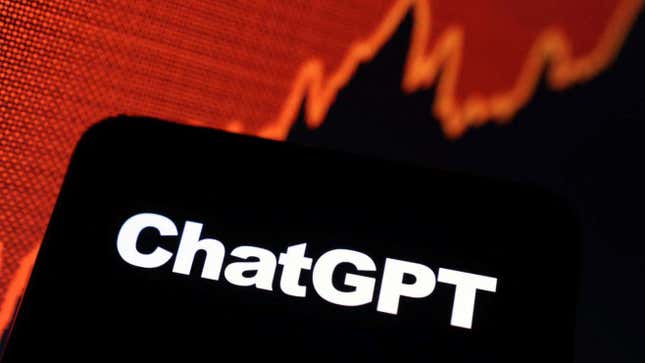
Hello, fellow humans! You’re reading our limited series of Saturday Daily Briefs. While it’s focused on AI, it’s curated, written, and edited by actual people.
Got some questions about AI you’d like answered? Or just some AI hallucinations you’d like to share? Email us anytime. Enjoy!
Here’s what you need to know
OpenAI rehired Sam Altman. Arguably the world’s largest AI company (and also the world’s most tumultuous, at least this week) also brought on three new board members to replace those that ousted Altman, swinging governance from one more reliant on independent academics and researchers to one stocked with business, tech, and all-male perspectives.
Nvidia’s banner earnings had something to say about the future of AI—mainly that it’s here and now. The chip maker’s clients in both commercial and government sectors continue to grow as AI infrastructure is built out (and, ICYMI, here’s what we think OpenAI’s latest batch of chips says about the future of AI.)
AI software company C3.ai fired an undisclosed number of workers this week. Executives blamed the cuts on cost savings and employee performance.
Want to talk to an elderly relative—or even just the voice inside your head—about the whole OpenAI, Sam Altman, and Microsoft fiasco? Bryce Elder at the Financial Times has you covered.
What exactly is the cult of Sam Altman?
Since the release of ChatGPT nearly a year ago, Sam Altman, a serial entrepreneur and investor, has established himself as a public-facing CEO. His outreach to regulators and world leaders has been well-received, earning him a reputation of friendliness and cooperativeness that has eluded other big tech leaders like Mark Zuckerberg and Elon Musk.
Previously, at the tech accelerator Y Combinator, he mentored other startup founders, which requires being able to listen to people’s needs, a skill that perhaps also sets him apart from many other tech CEOs.
Luis Videgaray, a professor at MIT Sloan and a former finance minister of Mexico, said he has had several conversations with Altman, including one about financial systems and fintech. Not all of Altman’s predictions from that conversation came true, but some of them did, Videgaray said, adding, “He thinks about the future—not in an abstract way, but actually how to build the future and get there.”
Succession in Silicon Valley has always been messy
OpenAI could have learned a thing or two about succession from Apple, which has a plan that’s completely different from OpenAI’s… in that there actually is one.
Tim Cook, who is planning on sticking around for at least the next couple of years, is training several possible CEO candidates because he wants an internal successor at Apple. The 47-year-old company has had six different CEOs (OpenAI went through three in a week), and none but the first were brought in from outside.
But even the best-thought-out plans can’t entirely nix the drama. Quartz’s Ananya Bhattacharya looks back at Apple’s CEOs and their antics—firing parties and all.
Quotable: The biggest of the bigs
“Generative AI is the single most significant platform transition in computing history… In the last 40 years, nothing has been this big. It’s bigger than PC, it’s bigger than mobile, and it’s gonna be bigger than the internet, by far.”—Nvidia CEO Jensen Huang at Microsoft’s Ignite event last week
Huang’s talk may be big (and biased—his company’s business model depends on that statement being true), but Nvidia’s stock growth shows that investors are indeed putting some umph behind those words.
Other great AI reads
😴 San Francisco is losing sleep over the OpenAI meltdown
⛓️ OpenAI’s unusual nonprofit structure led to the dramatic ouster of a sought-after CEO
👋 Microsoft is making its own AI chip so it’s less dependent on Nvidia
💻 How AI is changing videoconferencing
⏸️ Why OpenAI had to put ChatGPT Plus sign-ups on pause

OpenAI got it together enough to have DALL-E 3 make us the above image.
ChatGPT’s home life may have just gone through total turmoil, but, as it reminds us whenever we try to anthropomorphize it, the chatbot is a tool, not a human being, and is unfazed by shake-ups in leadership. So, on the eve of its first anniversary (another thing it does not care about), we asked it to come up with a survey for you about the ways you’re using generative AI.
At first, ChatGPT made a survey filled almost entirely with questions about ethics, which wasn’t what we asked for. So we had to prompt it again to make a survey on how you use generative AI tools, not what you thought about them.
It also wanted a lot of your demographic information. That tracks, as most surveys do collect age, job, that kind of thing—we’ll let you keep that to yourselves. We’re just curious about how our Daily Brief readers are using generative AI in their daily lives.
Take the short 8-question, 5-minute survey that ChatGPT generated to tell us more about how you are (or aren’t) using AI. The bot swears it won’t be offended by the results, but it did promise to analyze them for us, so stay tuned for next week.
Did you know we have two premium weekend emails too? One gives you analysis on the week’s news, and one provides the best reads from Quartz and elsewhere to get your week started right. You can get those by becoming a member—and take 20% off!
Our best wishes for a very human day. Send any news, comments, quotes from older relatives about AI, and quotes from younger relatives, too, to talk@qz.com. Reader support makes Quartz available to all—become a member. Today’s AI in Focus Daily Brief was brought to you by Morgan Haefner and Susan Howson.